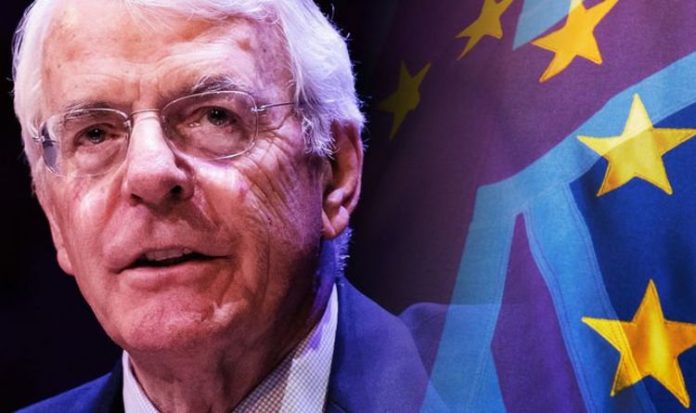Earlier this month, Tony Blair and Sir John Major urged MPs to reject the “shameful” attempt to override parts of the Brexit withdrawal agreement. The two former Prime Ministers accused the Government of “embarrassing” the UK by seeking the power to change the details of the treaty agreed with the EU last year. Writing in the Sunday Times, Sir John joined Mr Blair in saying the Government’s actions were “irresponsible, wrong in principle and dangerous in practice”.
They added: “It raises questions that go far beyond the impact on Ireland, the peace process and negotiations for a trade deal – crucial though they are. It questions the very integrity of our nation.”
It is not the first time the two former leaders put their party allegiances aside to condemn Brexit and tried to stop Britain’s withdrawal from Brussels.
Sir John’s battles to thwart Brexit are not a surprise, though, particularly given his role in further tying Britain to the bloc during his premiership.
As soon as he became Prime Minister in 1991, Sir John felt the relationship between Britain and the EEC – the precursor to the EU – had to change.
During a speech in Brussels, the Bristol-born politician expressed his desire to place “Britain at the heart of Europe” with the Maastricht Treaty.
The Treaty is the international agreement that saw what was then the EEC evolve into the EU with initially only 12 member states.
It laid down the groundwork for economic and monetary union with a single currency at its heart and new rules on inflation, debt and interest rate regulations.
The Treaty, though, which greatly increased the powers of the European Commission, was widely unpopular according to opinion polls and it is what arguably split the Conservative Party on the European issue for decades.
However, Sir John appeared completely unaware of its unpopularity.
JUST IN: Nicola Sturgeon accused of not being ‘transparent’ with public
In a 2016 interview, the former Prime Minister admitted he did not think the Treaty was controversial.
He told Total Politics: “People forget, before I went to negotiate Maastricht, I held a debate in which I set out my negotiating position in detail, and I got massive support in the House of Commons.
“To tell you the truth, I didn’t push it through because there was such a huge parliamentary majority for it I didn’t anticipate that it was going to be controversial.”
Instead, Sir John postponed the confrontation and, by the autumn of that year, he believes, the febrile atmosphere in his party had paved the way for a “different breed of Conservative” to emerge.
He added: “We chose the things that seemed a greater priority at the time, not anticipating the difference that a change of personnel on the Conservative benches would make.
“We came back after the 1992 election, and many of the people who had come in were among those who did most to cause us difficulty in getting that through.
“We could have pushed it through, but I didn’t.”
DON’T MISS:
Keir Starmer’s ONLY chance to become PM exposed [REVEALED]
Brexit: Australian Senator exposes incredible trade deal for UK [EXCLUSIVE]
How UK judge dissected Brexit international law row [ANALYSIS]
Ironically, in an exclusive interview with Express.co.uk, former Conservative MEP Daniel Hannan blamed Sir John for Brexit, as he argued he could have easily prevented it.
When asked why the former Prime Minister signed the Maastricht Treaty, Mr Hannan said: “That is a great question because he didn’t need to.
“His argument was that it was the minimum necessary to keep our foot in the door.
“But then when the Danish people voted against it, that should have been him off the hook.
“If he had taken that opportunity to repudiate the Maastricht Treaty or if he had granted a referendum on it, Britain I suspect would have ended up with some kind of associate status.
“We would have remained effectively under pre-Maastricht terms.
“Other members would have been able to go ahead with all the common and so on.
“We would have stayed out of it.
“And we would now be associate members to this day and Brexit would not have happened.
“But, as so often, the europhiles overreached.”







